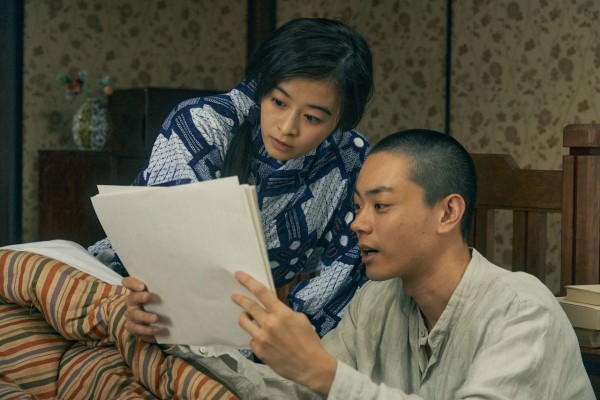IZURU NARUSHIMA: FATHER OF THE MILKY WAY RAILROAD 銀河鉄道の父 (2023)[ - JAPAN CUTS, JULY 26-AUGUST 6, 2023 NANA MORI, MASAKI SUDA IN FATHER OF THE MILKY WAY HIGHWAYA new biopic about a Japanese writer little known in the West
NANA MORI, MASAKI SUDA IN FATHER OF THE MILKY WAY HIGHWAYA new biopic about a Japanese writer little known in the WestWant to have a good cry? Watch a traditional biopic set in the early twentieth century, when there wasn't a cure for TB yet. Kenji Miyazawa (1896-1933) was the Hans Christian Andersen of Japan, but he got no popular, only critical, recognition, the younger sister he loved died of TB at twenty-four, and, after a richly varied creative and intellectual life (he played the cello, taught agronomy, wrote poems, novels, and stories), and a turbulent but ultimately affectionate relationship with his wealthy father, Kenji died at only the age of thirty-seven. Those are the basics of Izuru Narushima's film. Now, Miyazawa is widely read, and anime and manga adaptations are made about him and from his storytelling. There is a 1985 animated film (
Kenji Miyazawa's Night on the Galactic Railroad) that I haven't seen, and there may be much else. In his more knowledgeable
Japan Times review, Mark Schilling reports that the new film is based on a novel by Yoshinobu Kado.
Masaki Suda gives a rousing performance in the lead, febrile and sensitive. Miyazawa wasn't a handsome man, and the Wikipedia bio tells us he was asexual and died a virgin. But his opposition to taking over the generations-old family pawnshop business was passionate. He objected to the exploitation of farmers in the agriculturally poor area where they lived (the Iwate city of Hanamaki), though his father Masahiro (Koji Yakusho) said they were helping people the banks wouldn't touch. When he did take over the shop for a moment, he fell for a poor man's lies about children and farm losses. Then, he became a Nichiren Buddhist after being captivated by the reading of the Lotus Sutra. His drum-beat chanting was disturbing, though, when he did it after Toshi, his sister (Nana Mori), died, his father let him do it.
The warm relationship between Kenji and his father is at the heart of this film.
There is a lot going on here. There is a senile grandfather (Min Tanaka) who becomes difficult and violent, and there is a dramatic scene in which Kenji and his father try to calm the old man and coax him to go gentle into that good night. Watch for the overhead shot of Toshi, the sister's, funeral with the spread-out mourners all in identical white mourning garb, and Kenji breaking away to beat the drum and shout.
The other theme that is at the heart of the film is dying. Kenji is able to read some of his early, best, short stories to Toshi, making her happy and momentarily reviving her, as if they had an antibacterial effect.
Koji Yakusho (whom Schilling calls "Japan’s Tom Hanks") is excellent as Masahiro, a conventional, "straight" (not artistic) Japanese upper middle class man of the time, but progressive, hence his coming around to understanding and accepting Kenji's failure to take over the family business, even though he was the first-born son. This making peace between generations must be very satisfying for Japanese viewers, who still feel so strongly the pressure to conform or to pass on traditions, or such strong urges not to.
But there is also fascination in the complexity of the multitalented Kenji's too-short life, and that he achieved so much in spite of the aforementioned family pressures and the few years he had.
This is a conventional biopic. It's not Nolan's
Oppenheimer (which has the limitations of a biopic too). But in the Japanese tradition, and with traditionally high production values, this is a very good looking film, with many lovely exterior landscapes and period interiors of traditional Japanese houses.
And besides Japan's Tom Hanks, in nice-guy mode, we are getting a Masaki Suda who has erased his heartthrob image from the 2021 romance
We Made a Beautiful Bouquet and plays Kenji (as Schilling puts it) "with a shaved head, gaunt physique and eyes blazing with sincerity, passion and a touch of mania, religious and otherwise." This is still a biopic, as is
Oppenheimer, but there are satisfactions when one is done this well. We still need to see how the last century was, to be reminded that, while there were beauties and graces then, you might not have gotten very long to enjoy them. The last tear-stained - no, tear-
drenched - pages - scenes - also featuring Maki Sakai as Kenji's mother and Yûdai Toyoda as Seiroku , his younger brother, are magnificent. Director Narushiima, with the able assistance of Masaki Suda and the other cast members, will show you how to die, sweetly and nobly, surrounded by loving family.
Father of the Milky Way Railroad 銀河鉄道の父, 128 mins., released May 5, 2023, also shown at Shanghai June 10. Screened for this review as part of the July 26-Aug. 6, 2023 Japan Cuts, at the Japan Society in New York, where it was shown Sat., July 29, 2023 at 12:00 pm.





